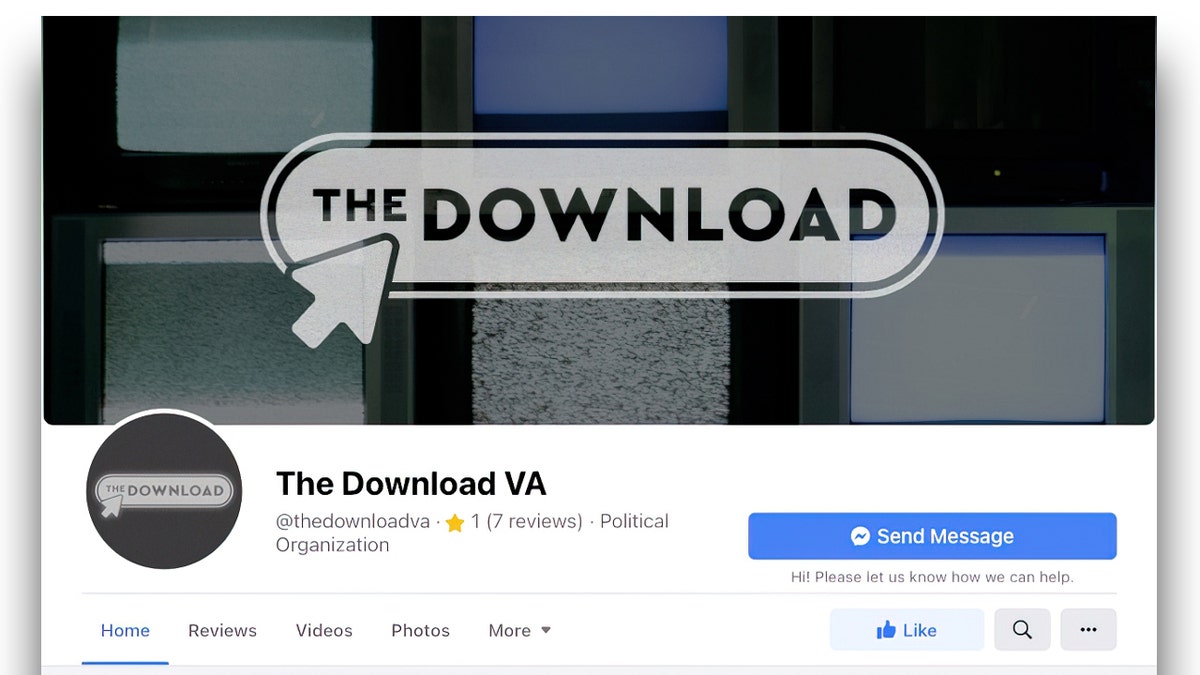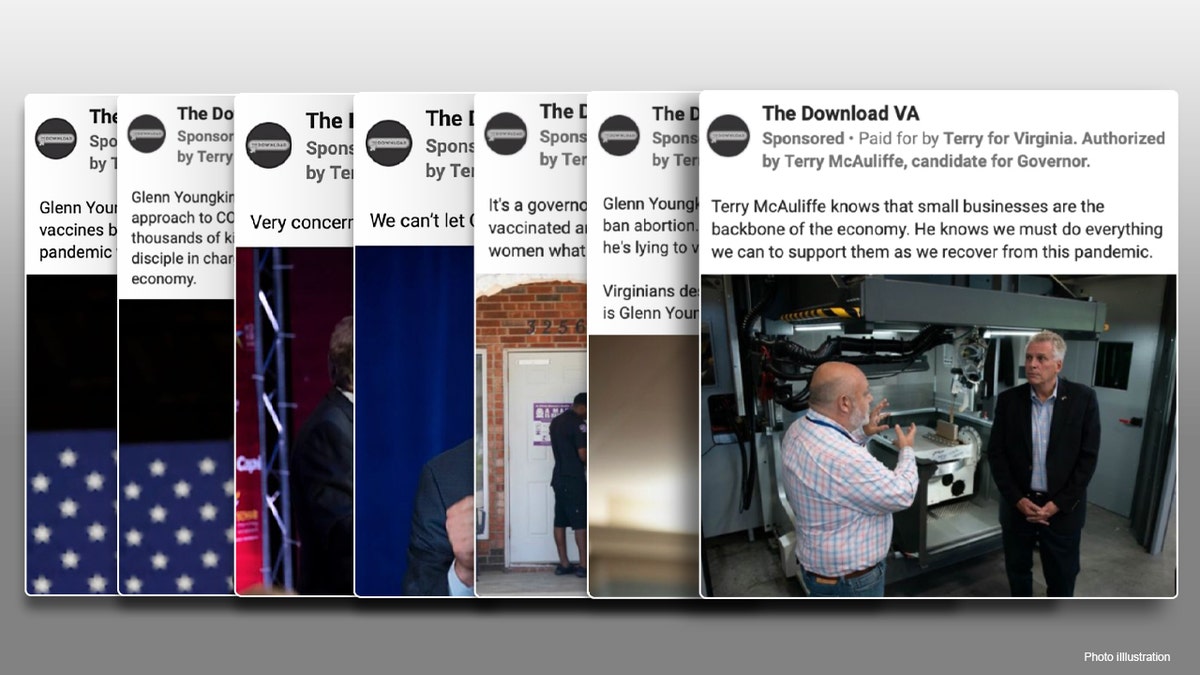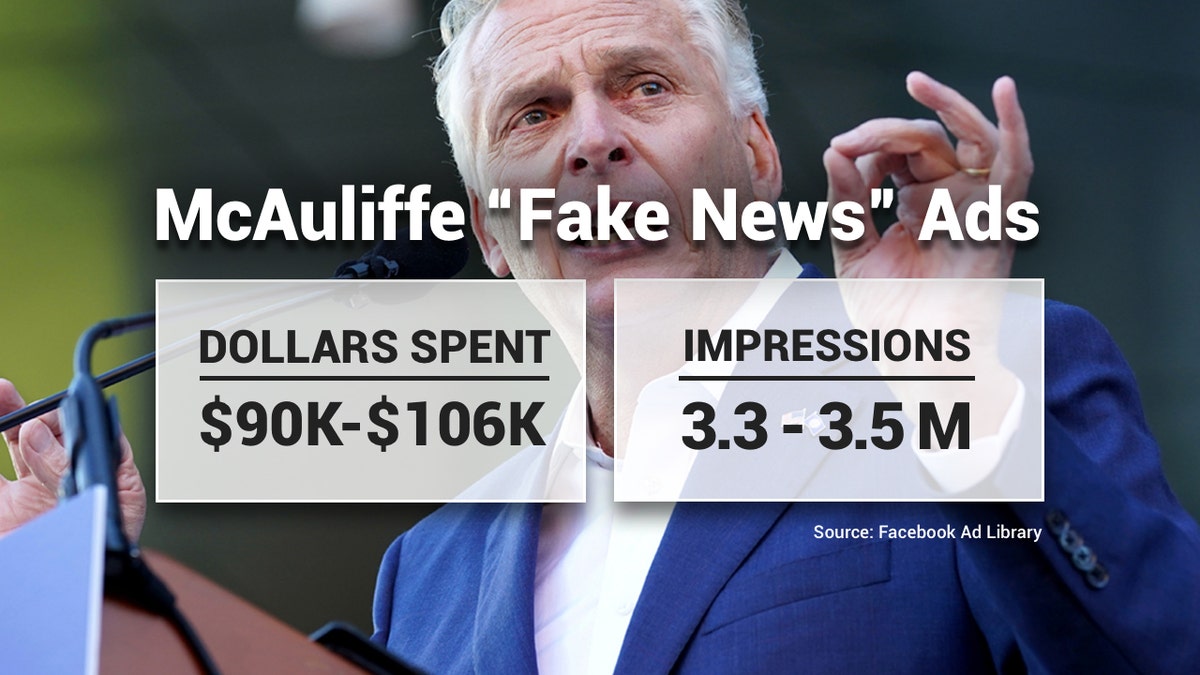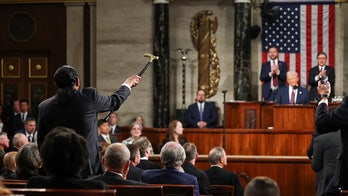McAuliffe camp spends nearly $100K advertising 'fake news'
Mike Emanuel reports on Fox News investigation into Dem disinformation
Former Gov. Terry McAuliffe has spent nearly $100,000 advertising "fake news" websites on Facebook during the Virginia gubernatorial campaign, Fox News can reveal.
The Democrat's advertisements, which have been viewed up to 3.5 million times so far, are hidden on a Facebook page with a similar name to a local news website. The ads link to third-party websites that ostensibly publish local news, but exist to promote Democratic candidates. The websites have been widely described as disinformation and "partisan propaganda."
The revelation comes less than a week before election day, and as the candidates fight for every last vote, with polls showing McAuliffe and rival Republican Glenn Youngkin locked in a tight battle.
MCAULIFFE’S DISINFORMATION ADS
The McAuliffe campaign’s advertisements are sophisticated and opaque.
Like most candidates, McAuliffe operates a Facebook page under his own name to promote his campaign. But the former governor also operates another Facebook page that blurs the lines between a political campaign and disinformation.

The page is called "The Download Virginia," and it was quietly launched by McAuliffe in June. While the name of the page sounds similar to that of a news organization, the page has not published any posts or photos, and only 67 people have "liked" the page (a term Facebook uses to describe followers).
Instead, most voters who have encountered "The Download" have done so through paid advertising. The ads do not appear on the page itself but can be obtained through a Facebook Ad Library Report, a tool used by journalists and researchers. The McAuliffe campaign has spent $471,044 on ads distributed by this page since June. With several ads running at time of publication, that number is likely to rise before election day.
The advertisements generally contain a comment and a link to a mainstream news article that covers the campaign favorably. But sprinkled among the links to legitimate media are seven separate advertisements (and dozens of variations) that promote websites widely considered to be "fake news".

In a July advertisement, The Download writes about McAuliffe’s views on small business. The ad includes a link to an article published by a third party website called The Virginia Dogwood.
The Dogwood presents itself as a local news website, with daily articles about local issues in Virginia, dedicated sections for key topics, and a newsletter to give Virginians "all the news you need." The Dogwood says on a page describing its publication that it delivers "credible, fact-based reporting."
The website notes it is owned and operated by Courier Newsroom, which according to the Dogwood, is a "civic media company." But Courier Newsroom was founded and initially funded by the liberal dark money group ACRONYM. According to the Wall Street Journal, early backers included multibillionaire Democratic donor George Soros, as well as LinkedIn co-founder Reid Hoffman and a group of movie producers. Axios reported yesterday that the "newsroom" has since been acquired by influential Democrat Tara McGowan’s "Good Information Project," which is backed by many of the same investors.
The Dogwood says the editor-in-chief of Courier Newsroom, as well as its own managing editor, have control over the editorial process.
In an October advertisement, The Download writes that Youngkin has a "very concerning" policy on vaccination, and includes a link to an article published by a third party website called the American Independent.
The Independent is also designed to look like a news website. In an "About" section, the website says it is a platform for "progressive news," and elaborates that it reports "with honesty and integrity, shining a light on those in power and the progressive politics movement," suggesting to readers that it offers an objective assessment of the movement. The website says it is funded by The American Bridge 21st Century Foundation (it does not disclose how much of its funding comes from the foundation, but it is the only investor listed on its "Company" page).
According to the Independent, the foundation is on a mission to "compare and contrast progressive and conservative solutions." It is actually a well-known liberal "dark money" organization, founded by David Brock, a wealthy and influential Democratic donor who is also a close ally of the Clinton family. The group spent $59.7 million to oppose Republican candidates in the 2020 election cycle, according to the campaign finance tracking organization OpenSecrets, though it is not clear how much of that money flowed to the Independent.
The website’s editors say that the foundation has no editorial influence.
Both websites are widely considered to be forms of political disinformation. Media ethics experts who spoke to Politico, which reported on the existence of Courier Newsroom in 2020, called sites like the Dogwood political tools that are "pouring gasoline on a raging fire of consumer trust and online disinformation." In a February 2020 editorial for the Washington Post, a correspondent for a fact checking organization said that Courier was creating "hyperlocal partisan propaganda." OpenSecrets labeled both websites as "fake news."

The McAuliffe campaign has spent a total of between $90,200 to $106,398 on advertisements linking to the Independent and the Dogwood. Those advertisements have garnered the campaign a total of between 3,290,000 and 3,470,000 "impressions," a term that Facebook uses to describe the number of screens that an advertisement has reached.
Each ad contains a disclaimer that it was paid for by "Terry for Virginia" and authorized by the candidate himself (Facebook requires candidates to add disclaimers like these to all political ads). But none of the advertisements disclose that the websites are considered to be "fake news" or that their information may be misleading.
That stands in contrast to the Democratic National Committee’s own stance against misleading information on social media platforms, issued as part of its plan for "combating online disinformation." A recent report issued by the DNC declares that "opacity in political ads" is an issue that social media companies need to address. It also admonishes Facebook for failing to "actively prioritize authoritative sources of news over non-trustworthy ones."
VIRGINIA GOVERNOR'S RACE: HOW TO VOTE
DEMOCRATS STAY SILENT
The DNC twice declined to comment about the McAuliffe campaign’s pattern of promoting misleading news sites or whether it endorses the advertising strategy that the former governor and DNC chairman is using. Similarly, the DNC declined to confirm if it continues to believe that opacity in political advertising is an issue.
The McAuliffe campaign also twice declined to comment about the page, the editorial stance of the misleading websites, or whether the campaign had coordinated with either of the misleading publications during this election. The campaign was running two advertisements that linked to the American Independent as recently as last week but disabled both ads three days after Fox News made inquiries.
Meanwhile, a Youngkin spokesperson told Fox News that "disinformation practices are standard for McAuliffe, whose lies go into overdrive when he’s desperate," adding, "not a single left-wing propaganda arm disguised as a news organization will turn the tide" for his opponent.
DIRTY TACTICS FROM BOTH CAMPAIGNS
McAuliffe’s advertising strategy has repeatedly raised ethical questions. Earlier in the campaign, the Washington Examiner reported that the former governor had authorized a deceptively branded mail advertisement. The ads tried to link Youngkin more closely to former President Trump, who has a relatively low favorability rating in the state. Similarly, the Washington Post reported last week that McAuliffe is using Google ads to promote mainstream news articles that have covered him favorably.
The Youngkin campaign has also employed ethically dubious tactics. The Huffington Post reported in September that a person who called in to a right-wing radio show to heavily praise Youngkin was not a listener of the program, but a staffer for the former businessman’s campaign.
More broadly, Democratic and Republican operatives and other people associated with the parties have a history of funding partisan media operations that obscure their purpose. While the Democrats benefit from the biased reporting of "Courier Newsroom," Republicans benefit from a similar effort called "Metric Media," which partners extensively with conservative operatives and advocacy groups. The Republican Governors Association also ran a "pseudo-news" site as recently as 2019.
Even so, Fox News could not find any evidence that Youngkin, or the Republican Party of Virginia, were promoting "fake news" websites in any Facebook advertising during this election. The investigation did not uncover a hidden page like "The Download," nor did Youngkin or the GOP link to any websites that are considered to be misinformation.
CLICK HERE TO GET THE FOX NEWS APP
DAYS REMAIN IN THE RACE
Voters in Virginia will wade through a deluge of political advertising in the final days of the campaign, as polling shows that neither candidate has a clear advantage.
Most recently, a Monmouth University poll of registered voters had both candidates tied at 46% support, but with 7% of voters still undecided. A recent Fox News Poll revealed that 51% of likely voters support McAuliffe and 46% support Youngkin, which puts both candidates within the +/- 3.5 point margin of error.
In an effort to win as many votes as possible, the campaigns are spending millions in the final stages of the campaign. Recent campaign finance disclosures show that the McAuliffe campaign spent $17.5 million during the month of September, while Youngkin spent just over $9.5 million total over the same period. A significant portion of that spending will be devoted to persuading voters with print, television, and digital advertising.
With several advertisements still running on "The Download" at time of publication, more Virginia voters can expect to be exposed to its messaging as well.















































